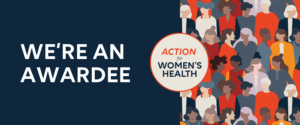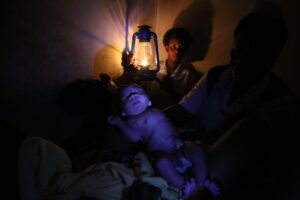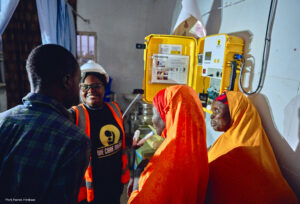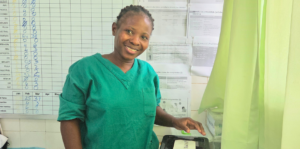By Benson Kibiti (Power for All) and Dr. Laura Stachel (We Care Solar)
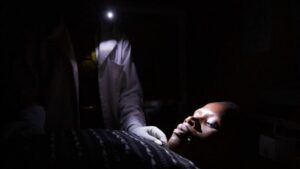 As Europe and the United States experience growing panic over the coronavirus and the challenge of tens of thousands of people to access intensive health care services, hundreds of thousands of people in Africa and southern Asia live each day with the certainty that they cannot access any healthcare at all.
As Europe and the United States experience growing panic over the coronavirus and the challenge of tens of thousands of people to access intensive health care services, hundreds of thousands of people in Africa and southern Asia live each day with the certainty that they cannot access any healthcare at all.
One barrier to accessing healthcare? A lack of reliable electricity. And the current virus is amplifying the urgency for a solution, as emphasized by Bill Gates, who warned recently that COVID-19 could overwhelm health systems in sub-Saharan Africa and have “very, very dramatic” consequences.
Universal healthcare and universal access to electricity are both global development goals. While hospitals in developed countries struggle to allocate medical resources to a population strained by COVID-19, health facilities in developing economies cope every day with infrastructure and energy access challenges.
When news headlines are dominated by COVID-19, we may not think about our reliance on power for health services. The fact is, electricity is needed for every aspect of emergency care.
A World Health Organization (WHO) review revealed that one in four health facilities in sub-Saharan Africa had no access to electricity, while only 28 percent of health facilities and 34 percent of hospitals had what could be called “reliable” access to electricity (without prolonged interruptions in the past week). Rural Health Statistics 2018 data showed nearly 40,000 government health facilities which serve an estimated 580 million people in rural India are still operating without electricity supply. More often than not, health facilities are forced to choose dirty, noisy, and CO2-spewing diesel generators as primary or back-up power systems.
Even when health facilities are connected to the grid, many suffer frequent power outages. WHO estimates that nearly 70 percent of medical devices used in developing countries (which are sensitive to voltage fluctuations) fail, with poor power quality a major contributing factor. Imagine the impact of power deficiencies on the provision of health care. Health workers struggle to work in near-darkness, relying on kerosene lanterns, candles, and cell phones. Medical equipment dependent on electricity lay dormant. There is no way to store vaccines or medications reliant on refrigeration. Blood banking becomes impossible.
As Gates noted, most of the excess deaths in Africa from the Ebola crisis were caused because the health service shut down. “It’s not just the direct effect, it’s also the panic, the overload, and the things that affect health workers because you’re already at a very limited capacity.”
Distributed renewable energy (DRE) solutions (stand-alone solar and mini-grid) represent a clean, cost-effective, rapidly deployable and reliable option to electrify healthcare centers, transforming lives whilst bolstering global efforts to achieve UN Sustainable Development Goal 3 – good health and wellbeing. Speakers at the 2019 Clean Energy for Health Care Conference noted that DRE and energy-efficient medical devices hold great potential for creating stronger and more resilient health systems in Africa and beyond. Solar systems can facilitate reliable and uninterrupted electricity supply critical for 24/7 emergency services, safe obstetric deliveries, neonatal care, and a robust cold chain for vaccines.
The United Nations Development Programme (UNDP) recently announced that under its Solar for Health Project, solar PV systems have been installed in 900 health facilities in 11 countries, including 388 facilities in Zimbabwe. The initiative was designed to increase access to health services by vulnerable populations, reduce carbon emissions, decrease electricity costs, and improve the overall power supply of health facilities.
We Care Solar has delivered more than 5,000 compact “Solar Suitcases” to maternal health facilities in Africa and Asia to improve the quality of obstetric care. Their countrywide Light Every Birth initiative was launched in four countries and ensured that 430 Liberian frontline health facilities have reliable power for childbirth. Liberian Minister of Health, Dr. Wilhelmina Jallah welcomed this “life-changing” initiative, recalling the struggles of health providers relying on lanterns for nighttime care. “They put you on the table but they cannot even see what they are doing because it’s dark…”
In India, Primary Health Centres (PHCs) are the foundation of the country’s rural healthcare system. The Chhattisgarh State Renewable Energy Development Agency (CREDA) and the State Health Department have collaborated to install, operate and maintain solar PV systems in 900 health centers across the state. Approximately 80,000 patients have benefited from these health centers per day leading to improved health outcomes. Access to regular electricity through PV electrification has also enabled reliable water supply to PHCs, powered surgical equipment, fans, and baby heaters. With adequate financing, the program could be extended to 40,000 health facilities for USD 85 million.
When news headlines are dominated by COVID-19, we may not think about our reliance on power for health services. The fact is, electricity is needed for every aspect of emergency care: medical lighting, laboratory tests, x-rays, CT scans, and the ventilators so vitally important for respiratory care. And solar electricity offers an immediate, cost-effective, and sustainable solution to this global challenge. As the world responds to the global pandemic of COVID-19, let us not overlook the importance of clean reliable electricity for health care. In developing countries, it is needed now more urgently than ever.
This article was first published on www.powerforall.org


